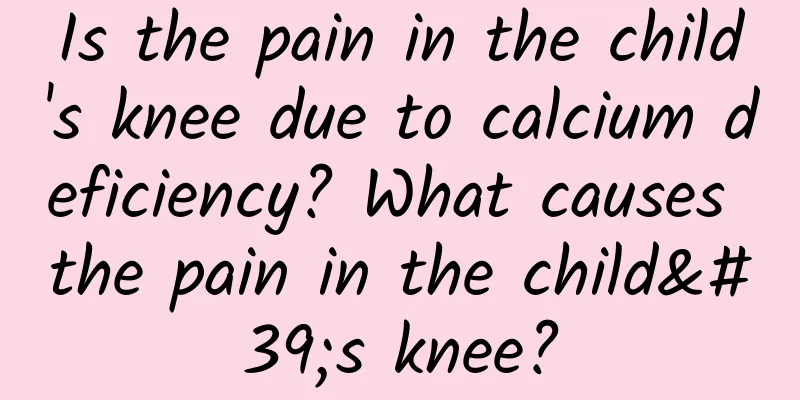Is the pain in the child's knee due to calcium deficiency? What causes the pain in the child's knee?

|
Children will experience growing pains, which means they will feel pain when they are growing taller. Some children may feel very uncomfortable. However, sometimes it is also necessary to rule out other problems. So is the child's knee pain due to calcium deficiency? Is the pain in the child's knee due to calcium deficiency?uncertain. First of all, you have to make sure whether your child has had any bumps, falls, etc. recently. If so, it is best to further confirm whether there is soft tissue contusion, or more serious cartilage damage or meniscus damage. Secondly, check for swelling or redness, and press with your fingers to see if the pain worsens. If so, consider synovitis or meniscus injury. If all the above situations are ruled out, then consider whether you are suffering from calcium deficiency or whether you have increased your activity recently, causing leg pain. If the pain is in the calf or thigh, there are generally two reasons to consider: the amount of activity increases a lot during the day, which leads to uncomfortable leg pain at night, with throbbing pain in the calf; or growing pains caused by calcium deficiency. What causes knee pain in children?There are three main reasons why children have knee pain: Transient synovitis of the hip joint. Symptoms include leg pain, lameness and obturator nerve innervation. In mild cases, the hip joint examination is normal. Children with mild lesions can be treated conservatively, with bed rest and no weight-bearing walking. It is generally recommended to rest for two weeks. If the disease lasts for more than one week, the symptoms will be more severe. Growing pains. Growing pains are the most vigorous physiological response in the early growth stage. Most occur during sleep at night, mainly in the knees and calves, with severe pain and leg cramps. Most people think it is related to excessive exercise. Local massage can be performed twice a day with the hands to relieve subjective symptoms, as well as calcium supplementation. Traumatic pain: If the pain is severe, such as muscle strain or fracture, you should go to the hospital for diagnosis and treatment. What to do when your child has growing pains1. Children suffering from growing pains do not need to be strictly restricted from their normal daytime activities. 2. Some necessary examinations should be done to rule out the above diseases that are not caused by growing pains. 3. Growing pains are a transient clinical phenomenon during the development of some children and will generally disappear on their own within 1-2 years, so parents do not need to be too anxious. 4. Minor pain can be relieved by leg massage. 5. If the child's sleep is affected or the pain is severe, non-steroidal anti-inflammatory drugs can be taken orally, such as ibuprofen suspension. In short, growing pains in children are benign, self-limiting, special clinical phenomena in the growth and development process of children. As long as pathological bone pain diseases are ruled out, excessive treatment is generally not required. |
>>: Why do my knees hurt when I squat? Is knee pain a sign of knee damage?
Recommend
A 16-year-old girl suffered for 8 years! A 10cm long worm was pulled out of her brain, and it was still alive! Many people have this hobby
recently, A 16-year-old girl from Zhaoqing, Guang...
Are there any symptoms of adhesions after cesarean section?
Female delivery is an important sign of the birth...
How effective is raw milk in promoting lactation?
Breastfeeding is something that most mothers have...
A woman with a mole on her ear
Moles are common on people's bodies. They are...
What is the cause of black menstrual blood?
Women have their periods every month, and normal ...
What should women do if they suffer from insomnia due to kidney deficiency? These foods are very effective
Nowadays, many women suffer from long-term insomn...
How to treat chronic pelvic inflammatory disease
Pelvic inflammatory disease is very harmful to wo...
The first menstrual period after childbirth is very light
After a woman gives birth, her menstrual cycle wi...
Is your child always procrastinating? The real reason is not as simple as you think
The child is too slow, I have to push him! ! In f...
What is the normal heart rate for women?
We have had many physical examinations since we w...
What can pregnant women eat to stop diarrhea immediately?
Pregnancy is a special stage. The gastrointestina...
4 bad habits in the kitchen may cause family members to suffer from cancer!
Planning丨Yinuo Editor: Yinuo Visual丨Zhang Shan Re...
43 days of pregnancy, some bleeding
Pregnancy means a lot to a family, and it is the ...
Ectopic pregnancy common site
What does ectopic pregnancy mean? Ectopic pregnan...
Causes of diarrhea during the fifth month of pregnancy
By the fifth month of pregnancy, the dangerous pe...









